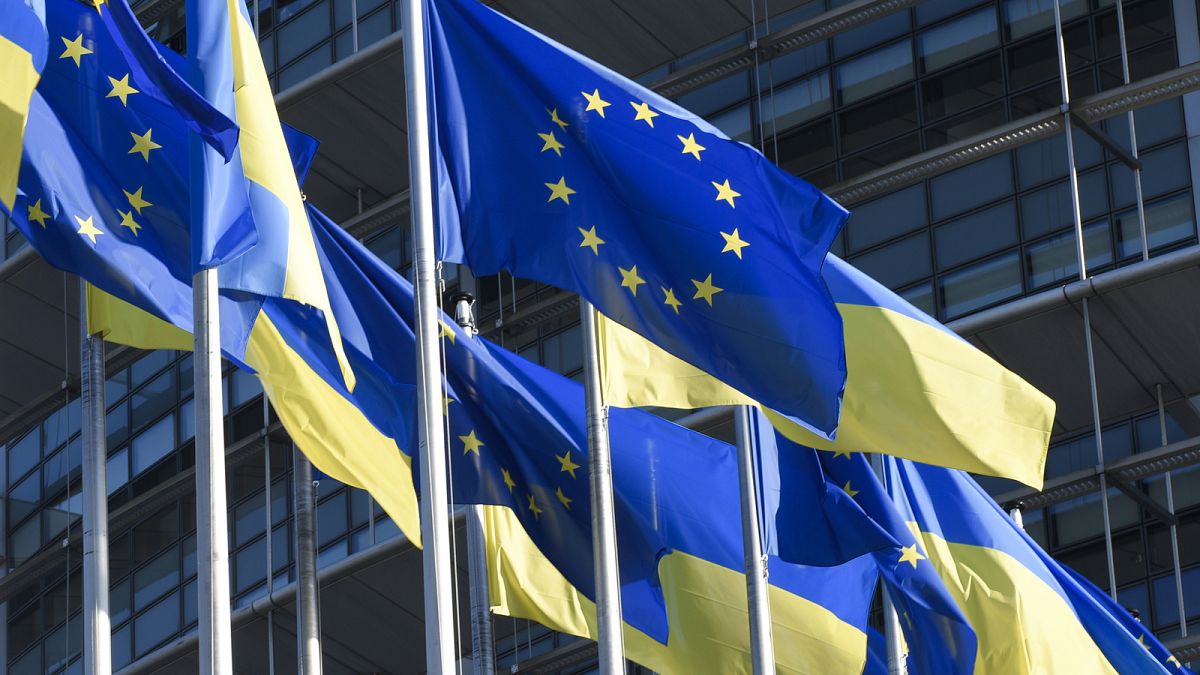Members sceptical of the bloc’s aid to Kyiv are more numerous and more organised than in the previous mandate.
The newly-elected European Parliament hopes to double down on its unwavering commitment to backing Ukraine when a sharply-worded resolution goes up for a vote in the Strasbourg plenary on Wednesday.
The move is a clear affront to the far-right wing of the hemicycle, which emerged slightly stronger from June’s European elections and which many fear will aim to erode the EU’s steadfast military, economic and humanitarian support to Ukraine.
It also comes as tensions over Hungarian Prime Minister Viktor Orbán’s controversial visit to Moscow threaten to spill over, with the EU executive vowing to boycott Hungary’s six-month presidency of the EU Council.
A draft of the resolution seen by Euronews, which carries no legal weight, “reconfirms” the parliament’s “unwavering commitment” to propping up Kyiv “for as long as it takes until Ukraine’s victory.”
The parliament’s president Roberta Metsola said on Tuesday that there was “huge support for this to be done in the first plenary session of this new parliament” and that Ukrainians had been questioning where Europe had been in the weeks since the elections to the European Parliament.
“Support for Ukraine will be, I’m sure, the trend of this parliament. Majorities will still be strong on that and this parliament will actually work with the other institutions where I’m sure the same direction will be made,” Metsola added.
Despite romping to victory in many key EU member states, the far-right surge was not powerful enough to prevent a coalition of centrist, pro-European parties from forming a majority following June’s European election.
But the radical right has since re-aligned into two new factions in a bid to wield new influence in the hemicycle. One of them, Patriots of Europe, has become the parliament’s third-biggest force and harbours two governing parties – Hungary’s Fidesz and the Netherlands’ Party for Freedom (PVV) – as well as the likes of France’s National Rally and Austria’s Party for Freedom.
Patriots, which has elected France’s Jordan Bardella as its president, is facing a tough call when the resolution is voted tomorrow. Bardella has himself gone to great lengths to purge his party of its Russia-friendly image, describing Moscow as a “multidimensional threat” and upholding Ukraine’s right to defend itself.
But the resolution is also expected to fiercely condemn Viktor Orbán’s recent visit to Moscow as part of his self-proclaimed peace mission, days after his government took up the rotating presidency of the EU.
Orbán’s move is described as a “blatant violation of the EU’s treaties and the EU common foreign policy,” with lawmakers saying Hungary should face “consequences.” It means it’s likely the Patriot group – which includes 11 Fidesz members – will be forced to vote down the resolution, further frustrating some of its member parties’ efforts to distance themselves from their historical Russia ties.
A Patriot spokesperson was contacted by Euronews but is yet to confirm whether the party had reached a common position on the draft resolution.
Pro-Europeans fear the geopolitical tide is turning
The resolution is also designed to reboot solidarity with Ukraine amid fears the geopolitical tide could be turning against it.
Donald Trump’s potential return to the White House after November’s US presidential election – a prospect many analysts believe is more likely following his recent assassination attempt – is casting doubt over the future of Western aid to Kyiv.
Orbán, who visited Trump at his Mar-a-Lago estate as part of his so-called peace mission, is seen to be trumpeting Trump’s messages in Europe, and will aim to use his faction in the European Parliament to do so.
In response, the centrist groups have vowed to cordon off the Patriots and the radical Europe of Sovereign Nations (ESN) group – which includes Alternative for Germany (AfD) and other parties considered sympathetic to Russia – from key leadership positions in the parliament.

